These articles take us back to a moment in sports history
as reported in a newspaper the next day.
as reported in a newspaper the next day.
The Boston Herald article 9/6/1918 on the First Game of the World Series at Comiskey Park in Chicago (held there instead of Wrigley Field because of the larger seating capacity). The same issue had several other articles about world and national affairs.
| BOSTON WINS FIRST WORLD SERIES GAME Babe Ruth Pilots Red Sox to 1-to-0 Victory Over Chicago Cubs STUFF'S SINGLE DOES THE TRICK Vaughn's Pass to Shean Is Followed by Hits by McInnis and Whiteman by BURT WHITMAN |
ALLIES DRIVE GERMANS OVER THE AISNE; HUMBERT'S ARMY TAKES 30 VILLAGES YANKEES IN BIG FORWARD DASH Follow up Hard After Capture of Bazoches and Fismette - Reach Vieil Arcy BRITISH CONTINUE TO GAIN OVER WIDE AREA (SUMMARY BY THE ASSOCIATED PRESS) |
|
CHICAGO, Sept. 5- Not the blasting big black bat of Babe Ruth, but his potent left arm quelled the Chicago Cubs 1 to 0 in the opening game of the war-time world series this afternoon at Comiskey Park. Twice did the colossus fall down on strikes at the bat, but his fiery southpaw service, fast ball and curve alike, proved more than enough to smash the haughty champions of the National League. A huge asset it is to come into such a partisan city and take first blood, the while Jim Vaughn, truly mighty southpaw of the Cubs was vainly trying his utmost to start the series with a Chicago win. Bust Comes in Fourth Search all the way through the big book of history of world series games and you never will find the yarn of such a contest. It was a battle of mighty flingers, both left-handers, both proven demigods of the hill, huge and powerful beyond the average of the diamond, which is unusually high. Neither team made an error and nothing that looked like a misplay. Mistakes of judgment there were, but of such is the entire story of baseball. There are those who wail that the game was below the world series standard in thrills. This is hardly the case. It is true that the crowd was slightly below 20,000, which was a disappointing feature, but it must be recalled that the morning was chilly and that there were little squalls of light rain during the middle of the day, just at that hour when many fans are thinking of making a start for the ball park, only to be turned back if conditions are inauspicious. By the margin of one hit the Cubs outwhacked the American league champions - six hits to five. But this means little, since Ruth was positively potent in the pinches, tighter than two adjoining seconds when the Cub threatened to become a bear. The big bust of the game, the only run of the contest, came in the fourth inning when Shean walked, Strunk popped up in a futile attempt to sacrifice, and Arlington Dave scored on successive base hits by George Whiteman and John Stuffy McInnis. You see, it was a succinctly Greater Boston victory since an Arlington lad paved the way for the tally by waiting out a walk, only to have the lad from Cape Ann, John Stuffy, hammer out the all important crash. Three cheers for the old Day State! It surely comes down to telling the story of how Vaughn pitched that fourth inning. Therein you get the full and complete story of the game since no other run was made. Big Jim lost out because he used his curve ball too much. Vaughn has only himself to blame for the use of the curve ball on right-hand batters of the Whiteman and McInnis type, lads who are known throughout professional baseball as vicious batters against left-handers, particularly when said southpaws take the liberty of throwing in dinky curves. Big Jim's best is his fast one. His curve ball is more or less dinky. You can see it coming and handle it fairly well. But his buzzer, the speedball, is a mighty breeze and is difficult to hit. I do not know whether Bill Killefer called for curve balls on McInnis and Whiteman, but the fact remains they were curve balls, and just busted up the ball game, giving Boston the all-important advantage of the first game. Cannot Fool Dave Shean drew two passes during the afternoon. The important one was in the fourth. Vaughn tried hard to get Dave by pitching on the inside, but the Arlington lad would not stand for it a moment and just looked them over with that calm, gentlemanly, reproving way of his, actually acting as if he were playing a practice game between the married and single men on Spy Pond Field. The old army game then was resorted to by the Bostonese. Amos Strunk, left-hand batter and very fast in getting down to first base, was told to bunt. He dropped his bat a little too far. The ball popped innocently to Jim Vaughn, and it was only alert, heads-up base running by Shean that prevented a double play. Georgie Whiteman, grizzled veteran of many big and little league campaigns, who was playing ball for money before Freddy Thomas started to get pennies for running errands for ma and the woman upstairs, already had hit one clean single to centre field. Vaughn pitched just the same, however, and with the count 3 and 1, Whitey hit a curve ball, one of those dinky things, to centre field, too wide for Charley Hollocher and on to Dodo Paskert in centre. Dode played the ball rapidly and held Sean to second. Dave Dashes Over Then McInnis called the turn. A high fast one whizzed by and ump-in-chief Hank O'Day called it a ball. Stuffy was set for the next. He was not looking for a pass, but for the old base blow, one to score Shean. Sure enough, it was that same dinky curve ball, and maybe you don't think John was ready for it. He slammed it to left field and Shean, who did not wait at all to see whether the ball might be caught by Mann, started a mad dash for the plate, and made it ahead of Less Mann's frenzied throw. The fact of the matter is that Stuffy did not hit that ball very hard. It took Mann quite a time to get the ball in his hand. He has a powerful throwing arm and it is well that Dave got the good start and that Stuff's whack did not get to Mann, some thrower, any sooner. |
The French and Americans are fast driving the Germans out of their positions in southern Picardy and in the sector between the Vesle and Aisne rivers. So rapid has been the progress of the allies - the French in Picardy and the Americans and French from Soissons eastward toward Rheims - that the retirement of the enemy has almost the appearance at present of the beginning of a rout. Meanwhile Field Marshal Haig in the north, from Peronne to Ypres, has been almost as busily engaged with his troops in carrying out successful manoeuvres which are onlyin a slightly less degree of rapidity forcing the Germans everywhere to give ground. Haig's men again have made the Germans taste bitter defeat on numerous sectors, and the end of the punichment for them seems not yet in sight. In the latest fighting in the region extending from the old Noyon sector to Soissons the French have reclaimed 30 villages from the Germans; have crossed the Somme canal at several points and are standing only a short distance from the important junction of Ham with its roads leading to St. Quentin and La Fere. Crossings of Ailette River On the south they have made further crossings of the Ailette river and are fast skirting the great wooded region which acts as a barrier to direct attack on Laon, the Chemin-des-Dames and the western Aisne defences of the enemy. Seemingly, at the present rate of progress, this barrier will shortly have been overcome and, indeed, the entire salient northwest of Soissons obliterated. Already the French south of Fresnes on the fringe of the high forest of Coucy have penetrated the old Hindenberg line. |
| 58 NEW ENGLAND NAMES ADDED TO CASUALTY LIST Two Commissioned Officers Among Those Killed in Action - Official List for the Country Contains 565 Names
The honor roll for New England as compiled yesterday was increased by
58 new names, 20 of whom gave up their lives for the cause. The official lists as issued for publication yesterday afternoon and this morning contained 38 names, unofficial reports to relatives and friends adding a score more. Among those killed in action were the names of two commissioned officers. ... Four Sons in Service An unofficial report that Priv. Louis T. Dietner of Gloucester has been wounded in action brings to light the fact that three other members of his family are in the service. |
|
|
WARNS PUBLIC OF GRIP EPIDEMIC 350 Sailors at Commonwealth Pier Affected An epidemic of influenza prevails among the sailors stationed at Commonwealth Pier and the state department of health yesterday issued a warning to civilians to take such measures as they can to protect themselves from the expected spread of the disease. More than 3350 cases have been unofficially reported from the pier within a week. "Unless precautions are taken, the disease in all probability will spread to the civilian population of the city," said Dr. john S. Hitchcock, in charge of the division of communicable diseases. "The malady appears to be in the nature of old-fashioned grip. No deaths have occurred. The naval medical authorities who have the matter in charge are doing everything humanely possible to control the outbreak. Now the daily list of cases appears to be diminishing. "With a focus of infection of this size, it seems probable that the disease will escape into the civil community in spite of all efforts at control. People should be reminded that under these conditions persons with coughs and colds are not choice companions, and that a good doctor is a friend. It should also be remembered that our past experience with this disease has shown the danger of persons suffering from it continuing at work or trying to return to their occupation sooner than safety dictates." 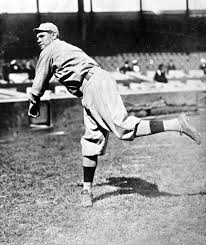 Babe Ruth 1918 |
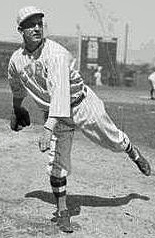 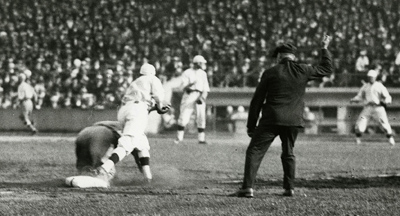 L-R: Hippo Vaughn, Game 1 Action 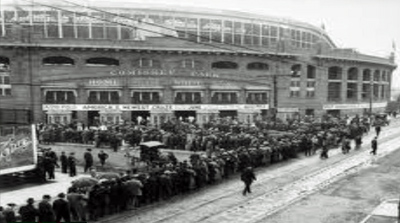 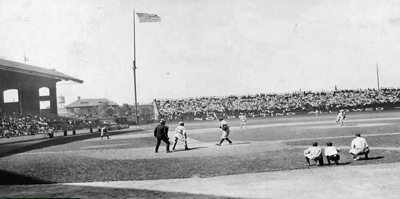 Comiskey Park 1918 |
LINKS